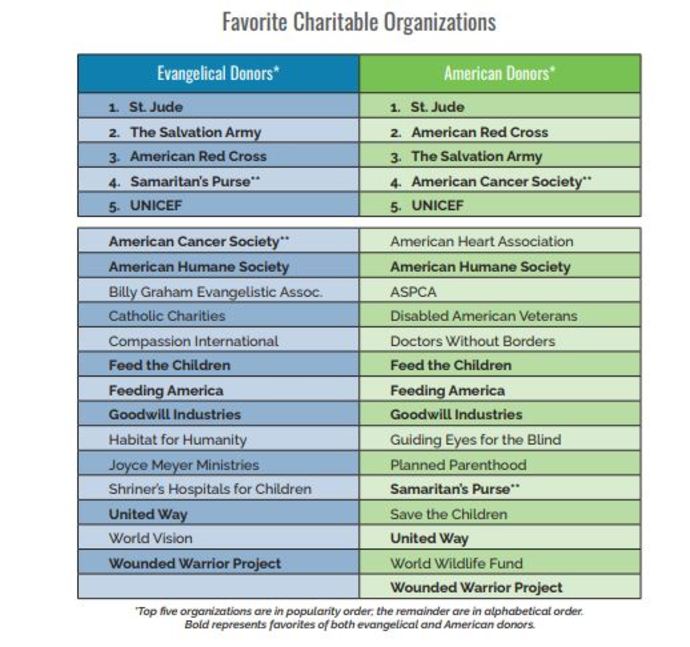Out of the 59 million Evangelical Protestants living in the United States, only 16 million name a faith-based nonprofit organization as their favorite charity, while 18 million favor organizations that are not Christian, according to new data released this week by Infinity Concepts and Grey Matter Research.
Some 25 million Evangelicals do not give to organizations at all outside their church, the report added, including 11 million who do not even give to a local church.
Of the 18 million who favor non-Christian organizations, a portion are giving to nonprofits that really have no Christian equivalent, such as the Alzheimer’s Association or the American Society for the Prevention of Cruelty to Animals. But others are giving to organizations where well-established Christian ministries exist, like UNICEF.
The report, the eighth in a series produced by Infinity and Grey Matter and the third to focus on giving habits and preferences, aimed to identify the favorite ministries and charities of America’s Evangelicals. To do so, they surveyed more than 1,000 American Evangelicals, defined as people who agree with the following principles: The Bible is the highest authority for what I believe; it is important for me to encourage non-Christians to trust Jesus Christ as their savior; Jesus Christ’s death on the cross is the only sacrifice that could remove the penalty of my sin; and only those who trust in Jesus Christ alone as their savior receive God’s free gift of eternal salvation.
84% of Evangelicals say they prefer to support faith-based organizations
More than half (52%) of Evangelicals claimed that they prefer to support organizations “that have their Christian faith as a major part of the work they do,” and another 32% said they prefer organizations that “have a Christian background or perspective but are not necessarily conducting specifically Christian work.” In other words, 84% of Evangelicals claim to prefer to support faith-based organizations, according to the survey. However, when asked what organizations they give to, only 46% actually have a favorite organization that is Christian, and the majority (54%) prefer supporting an entirely secular organization.
The rest of the Evangelicals (16%) said that they either prefer to support nonprofits that “have no particular religious background and do no religious work” or that for them “religion is not something I consider when I select organizations to support.”
When examining the situation more closely, among those who said they prefer an organization with a Christian background but not necessarily focusing on specifically Christian work, 33% do favor a faith-based organization. But the rest - 67% - actually name organizations as their favorite that do not have any Christian background or perspective.
“Have you ever had a friend or colleague who talked a good game about eating healthy, but then every time the two of you go to lunch, the suggestion is fast food?” the authors asked. “Many evangelicals (like many people in general) have this same problem when it comes to giving.
"Forty-five percent of Evangelical donors claim to prefer supporting a faith-based organization and actually name a faith-based organization as their top priority for giving. But 40% claim to prefer supporting a faith-based organization, while actually favoring one that has no Christian involvement," they wrote.
When it comes to charity, Evangelicals are not that different than most Americans
Why are more Christians not supporting faith-based nonprofits?
The survey showed that the main reason is that Evangelical donors desire to help people regardless of their religious beliefs.
This makes Evangelicals strikingly similar to American donors in general, something which Grey Matter Research and Op4G examined together in 2018 in a report called “What America’s Favorite Charities Have in Common.” Then, they asked a representative sampling of American adults to name their top charitable organization - much as they did with Infinity Concepts for this survey.
“Back in 2018, we learned that just 20 organizations account for 54% of the favorite organizations named,” the authors explained. “In fact, the top five brands account for over one-third of donors. Pretty amazing when you consider there are around 1.2 million nonprofits and ministries in the US (aside from churches).”
Similarly, just 19 different organizations accounted for the favorites of 53% of the Evangelical donors. And 12 of the top 19 were among the favorite brands of American donors. Just seven of the organizations are faith-based or faith-related in any way.
The most popular causes among Evangelicals, according to the survey, are specific diseases such as cancer or diabetes (19%), international relief and development (18%), domestic poverty and homelessness (12%) and community support (11%).
These were also among the most favored causes of Americans in general though they also tended to favor helping animals, emergencies/disasters and overall health.
When looking at specific organizations, the top five favored by American Evangelicals were found to be UNICEF, Samaritan’s Purse, American Red Cross, The Salvation Army and St. Jude Children’s Research Hospital.

“Where we do see differences—and this has been a consistent theme throughout our Evangelical research, even on topics completely unrelated to giving—is that the more spiritually engaged evangelicals are, the more they behave differently from the non-evangelical population,” the authors concluded. “In this case, the more evangelicals attend church, read the Bible, and/or participate in a small group, the more likely they are to give, the more generous they are in their giving.”
